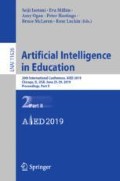Abstract
To inform the utility of interventions delivered by adaptive educational technologies, we investigated the relationship between student grades and three target constructs, namely self-regulation, motivation, and self-theory of intelligence, in classroom and online settings. To do so, we collected data from a large sample of undergraduate university students (N = 1453) enrolled in either a traditional face-to-face course or an online course and analyzed the data using hierarchical regression analysis. Prior research suggests that self-regulation, motivation, and self-theory of intelligence influence students’ academic achievement. However, to date a hierarchical regression model including all three constructs has not been tested. Our results show that self-regulation and motivational constructs are positively associated with grades, but the self-theory of intelligence construct is not. Furthermore, we show that context does matter: the model for the classroom sample explained substantially more variance in grades as compared to the online model.
Access this chapter
Tax calculation will be finalised at checkout
Purchases are for personal use only
References
Arroyo, I., Mehranian, H., Woolf, B.P.: Effort-based tutoring: an empirical approach to intelligent tutoring. In: Proceedings of Educational Data Mining Conference 2010, pp. 1–10 (2010)
Bae, Y.: The relationships among motivation, self-regulated learning, and academic achievement. Doctoral dissertation, Texas A & M University (2014)
Blackwell, L.S., Trzesniewski, K.H., Dweck, C.S.: Implicit theories of intelligence predict achievement across an adolescent transition: a longitudinal study and an intervention. Child Dev. 78(1), 246–263 (2007)
Chen, J.A., Pajares, F.: Implicit theories of ability of Grade 6 science students: Relation to epistemological beliefs and academic motivation and achievement in science. Contemp. Educ. Psychol. 35(1), 75–87 (2010)
Cohen, J., Cohen, P., West, S.G., Aiken, L.S., et al.: Applied Multiple Regression/Correlation Analysis for the Behavioral Sciences. Lawrence Erlbaum, Hillsdale (1983)
Costa, A., Faria, L.: Implicit theories of intelligence and academic achievement: a meta-analytic review. Front. Psychol. 9 (2018). https://doi.org/10.3389/fpsyg.2018.00829
De Castella, K., Byrne, D.: My intelligence may be more malleable than yours: the revised implicit theories of intelligence (self-theory) scale is a better predictor of achievement, motivation, and student disengagement. Eur. J. Psychol. Educ. 30(3), 245–267 (2015)
Dweck, C.S.: Self-theories: Their Role in Motivation, Personality, and Development. Psychology Press, Philadelphia (1999)
Dweck, C.S., Master, A.: Self-theories motivate self-regulated learning. In: Schunk, D.H., Zimmerman, B.J. (eds.) Motivation and Self-Regulated Learning: Theory, Research, and Applications, pp. 31–51. Taylor & Francis, New York (2008)
Forbes-Riley, K., Litman, D.: When does disengagement correlate with learning in spoken dialog computer tutoring? In: Biswas, G., Bull, S., Kay, J., Mitrovic, A. (eds.) AIED 2011. LNCS (LNAI), vol. 6738, pp. 81–89. Springer, Heidelberg (2011). https://doi.org/10.1007/978-3-642-21869-9_13
Garcia, T., Pintrich, P.R.: Assessing students’ motivation and learning strategies in the classroom context: the motivated strategies for learning questionnaire. In: Birenbaum, M., Dochy, F.J.R.C. (eds.) Alternatives in Assessment of Achievements, Learning Processes and Prior Knowledge, vol. 42, pp. 319–339. Springer, Dordrecht (1996). https://doi.org/10.1007/978-94-011-0657-3_12
Gonida, E., Kiosseoglou, G., Leondari, A.: Implicit theories of intelligence, perceived academic competence, and school achievement: testing alternative models. Am. J. Psychol. 119(2), 223–238 (2006)
Grant, H., Dweck, C.S.: Clarifying achievement goals and their impact. J. Pers. Soc. Psychol. 85(3), 541–553 (2003)
Hershkovitz, A., Nachmias, R.: Developing a log-based motivation measuring tool. In: Proceedings of Educational Data Mining Conference 2008, pp. 226–233 (2008)
Karumbaiah, S., Lizarralde, R., Allessio, D., Woolf, B.P., Arroyo, I., Wixon, N.: Addressing student behavior and affect with empathy and growth mindset. In: Proceedings of the Educational Data Mining Conference 2017, pp. 96–103 (2017)
Komarraju, M., Nadler, D.: Self-efficacy and academic achievement: why do implicit beliefs, goals, and effort regulation matter? Learn. Individ. Differ. 25, 67–72 (2013)
Lynch, D.J.: Motivational factors, learning strategies and resource management as predictors of course grades. Coll. Stud. J. 40(2), 423–428 (2006)
Mudrick, N.V., Sawyer, R., Price, M.J., Lester, J., Roberts, C., Azevedo, R.: Identifying how metacognitive judgments influence student performance during learning with MetaTutorIVH. In: Proceedings of the International Conference on Intelligent Tutoring Systems 2018, pp. 140–149 (2018)
Paunesku, D., Walton, G.M., Romero, C., Smith, E.N., Yeager, D.S., Dweck, C.S.: Mind-set interventions are a scalable treatment for academic underachievement. Psychol. Sci. 26(6), 784–793 (2015)
Pintrich, P.R., De Groot, E.V.: Motivational and self-regulated learning components of classroom academic performance. J. Educ. Psychol. 82(1), 33–40 (1990)
Pintrich, P.R., Smith, D.A.F., Garcia, T., McKeachie, W.J.: A Manual for the Use of the Motivated Strategies for Learning Questionnaire (MSLQ). University of Michigan, Ann Arbor (1991)
Rodrigo, M.M.T., et al.: The effects of motivational modeling on affect in an intelligent tutoring system. In: Proceedings of International Conference on Computers in Education 2008, pp. 64–72 (2008)
Tempelaar, D.T., Rienties, B., Giesbers, B., Gijselaers, W.H.: The pivotal role of effort beliefs in mediating implicit theories of intelligence and achievement goals and academic motivations. Soc. Psychol. Educ. 18(1), 101–120 (2015)
Wampold, B.E., Freund, R.D.: Use of multiple regression in counseling psychology research: a flexible data-analytic strategy. J. Couns. Psychol. 34(4), 372–382 (1987)
Yeager, D.S., et al.: Using design thinking to improve psychological interventions: the case of the growth mindset during the transition to high school. J. Educ. Psychol. 108(3), 374–391 (2016)
Zimmerman, W.A., Kulikowich, J.M.: Online learning self-efficacy in students with and without online learning experience. Am. J. Distance Educ. 30(3), 180–191 (2016)
Author information
Authors and Affiliations
Corresponding author
Editor information
Editors and Affiliations
Rights and permissions
Copyright information
© 2019 Springer Nature Switzerland AG
About this paper
Cite this paper
Theus, AL., Muldner, K. (2019). Informing the Utility of Learning Interventions: Investigating Factors Related to Students’ Academic Achievement in Classroom and Online Courses. In: Isotani, S., Millán, E., Ogan, A., Hastings, P., McLaren, B., Luckin, R. (eds) Artificial Intelligence in Education. AIED 2019. Lecture Notes in Computer Science(), vol 11626. Springer, Cham. https://doi.org/10.1007/978-3-030-23207-8_53
Download citation
DOI: https://doi.org/10.1007/978-3-030-23207-8_53
Published:
Publisher Name: Springer, Cham
Print ISBN: 978-3-030-23206-1
Online ISBN: 978-3-030-23207-8
eBook Packages: Computer ScienceComputer Science (R0)

